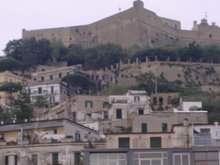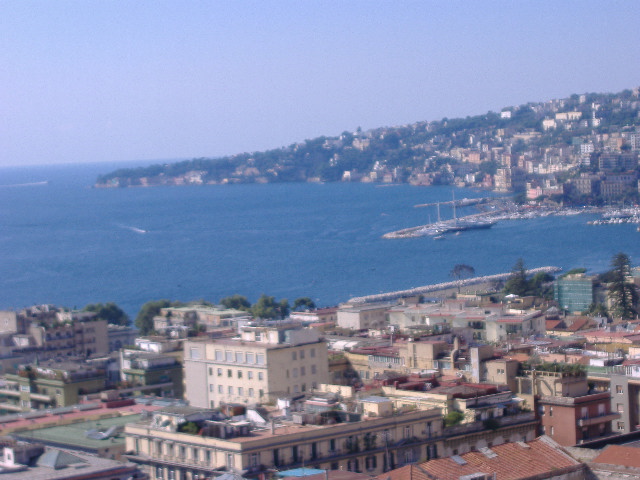The Southern Question...that is not the question!
Naples does not fit squarely either within discourses of Italian colonialism or of the Southern Question. As a stop on the Grand Tour, a repository of “Italian” culture and (Greco-Roman) history, as an urban capital, the Southern agrarian discourse of the likes of Franchetti and Villari noticeably omits Naples from its equations [9].
Although Neapolitans have been considered backward, superstitious, pagan, ignorant, villainous (like their Sicilian brethren), they do not seem to have been specifically targeted for immigration to Africa. Anthropologists of the southern Italy like Banfield and De Martino have focused on pastoral regions such as Lucania and the Salento, the most isolated areas untouched by external influences [10].
If anything, the relationship of Naples to Italian colonialism was as a cultural and psychological midway point between rational Italy and fantastical Africa, a sort of gateway to the dreamscape of the Red Sea [11].
Though a site for Italian colonial propaganda (e.g. La Mostra d’Oltremare), Naples was not re-dressed by the Fascists, and does not run parallel to the construction of the city of Asmara, for example, or of Eritrean identity vis-á-vis the Italian state [12].
The divisions in Naples run along class, not racial, lines in vertical patterns: the rich on the Vomero hill, the poor below; the privileged few on the top floor of a palazzo nobile, the indigent many in the illegal street-level bassi.
It might be possible, however, to address contemporary Neapolitan identity in terms of Jorge de Alva’s sense of postcoloniality: “subjectivity ‘after’ the colonial experience as a subjectivity of oppositionality to imperializing/colonizing (read: subordinating/subjectivizing) discourses and practices”13].
I am thinking specifically about a Neapolitan “subjectivity of oppositionality” in which the foreign tout court is considered a colonizing force. “Siamo africani,” in this sense, speaks to being the ultimate Other, which I seek to demonstrate as the fundamental content and structure of contemporary napoletanità. Jane Schneider writes, “Within the political economic tradition, there is a compelling argument that the difficulties of the South are rooted in a colonial or near-colonial past” [14].
However, I hesitate to push Schneider and de Alva further because I am quite sure that the colonial/postcolonial framework is ultimately unsuited to understanding contemporary Neapolitan identity construction.
In the broadest sense, Naples and urban centers in general are not the focus of the Southern Question architects, in particular in the intermingling of the question with the Italian colonial project. Franchetti et al. concentrate on the southern peasantry: “Within parliamentary discussions of ‘demographic colonialism,’ agriculture came into focus as both the target and the apparatus of Italian rule” [15].
The poor, unskilled laborers of Naples would probably have been the last on the list to be sent to settle Eritrea, seeing as they might have been perceived as a risk to the maintenance of Italian prestige and power in the colony [16].
Even those who sought to address the problems peculiar to Italy’s urban sites tended to produce Naples as unrepresentative or as a representative extreme. In “The Emergence of the Southern Question in Villari, Franchetti, and Sonnino,” Nelson Moe acknowledges Naples’ uneasy fit in the rhetoric of Villari’s Southern Letters: “In his first Southern Letter on the camorra, Villari thus raises not so much the ’question of the cities’ as the ‘question of Naples,’ unique and incomparable” [17].
9 Rhiannon Noel Welch is my preferred source on this subject. Welch, Rhiannon Noel. “Leopoldo Franchetti’s
(Re)productive Southern Bodies on the Colonial Front.” Unpublished paper, 2008.
10 Banfield, Edward C. The Moral Basis of a Backward Society. New York: The Free Press, 1958; De Martino,
Ernesto. The Land of Remorse: A Study of Southern Italian Tarantism. London: Free Association Books, 2005.
11 Pianavia Vivaldi, R. Tre anni in Eritrea. Milan: Cogliati, 1901. [Please forgive the absence of the quote and page
number: I lent my copy to a friend and he took it with him...to Naples!]
12 I am, of course, alluding to Fuller, Mia. ”Wherever You Go, There You Are: Fascist Plans for the Colonial City of
Addis Ababa and the Colonizing Suburb of EUR ’42.” Journal of Contemporary History. Vol. 31 (1996), 397-418.
13 Quoted in Loomba, Ania. Colonialism/Postcolonialism. London and New York: Routledge, 1998, (12).
14 Schneider, Jane. “Introduction: The Dynamics of Neo-orientalism in Italy (1848-1995).” Italy’s “Southern
Question:” Orientalism in One Country. Oxford and New York: Berg, 1998. (12). 15 Welch, 3.
16 Barrera, Giulia. “Racial Hierarchies in Colonial Eritrea” in A Place in the Sun: Africa in Italian Colonial Culture
from Post-Unification to the Present, ed. Patrizia Palumbo, Berkeley: University of California Press, 2003.
17 Moe, Nelson. “The Emergence of the Southern Question in Villari, Franchetti, and Sonnino.” Italy’s “Southern
Question:” Orientalism in One Country. Oxford and New York: Berg, 1998, (56).

